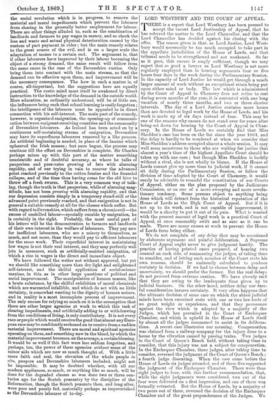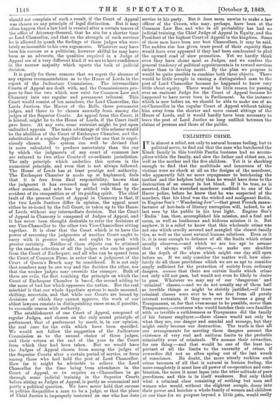LORD WESTBITRY AND THE COURT OF APPEAL.
THERE is a report that Lord Westbury has been pressed to accept the vacant Lord Jasticeship of Appeal, that he has referred the matter to the Lord Chancellor, and that the Lord Chancellor has decided against his closing with the offer. The reason given is that, as Lord Justice, Lord West- bury would necessarily be too much occupied to take part in the appellate jurisdiction of the House of Lords, and that tribunal needs to be strengthened and not weakened. So far as it goes, this excuse is amply sufficient, though we may regret that so good a lawyer as Lord Westbury is not more regularly employed than in hearing arguments four or five hours four days in the week during the Parliamentary Session. In the capacity of Lord Justice he would get through a much larger amount of work without an exceptional strain being put upon either mind or body. The law which is administered by the Court of Appeal in Chancery does not retire to rest during seven months of the year, it is contented with one long vacation of nearly three months, and two or three shorter intervals. The day of a Lord Justice contains more hours than are devoted to legal work by the House of Lords, and his week is made up of six days instead of four. This may be one of the reasons why causes do not stand over for years after being set down for hearing by the Court of Appeal in Chan- cery. In the House of Lords we certainly find that Miss Shedden's case has been on the list since the year 1864, and the delay is hardly to be wondered at when we consider that Miss Shedden's address occupied almost a whole session. It may well seem monstrous to those who are waiting for justice that almost a year's time of the highest Appellate Court should be taken up with one case ; bat though Miss Shedden is luckily without a rival, she is not wholly to blame. If the House of Lords cannot give up more time to judicial work, if it cannot sit daily during the Parliamentary Session, or follow the division of time adopted by the Court of Chancery, it would surely be advisable to remodel the constitution of our Courts of Appeal, either on the plan proposed by the Judicature Commission, or on one of a more sweeping and more revolu- tionary tendency. Some persons object to anything being done which will detract from the historical reputation of the House of Lords as the High Court of Appeal. But if it is not up to its work, and is not capable of improvement, it would be a charity to put it out of its pain. What is wanted with the present amount of legal work is a practical Court of Appeal, at once reasonably swift and as sure as it can be made. There are many causes at work to prevent the House of Lords from being either.
We do not complain of any delay that may be occasioned by elaborate argument and painful deliberation. A Supreme Court of Appeal ought never to give judgment hastily. The practice of having printed cases prepared, of hearing two counsel on each side, of summoning the judges, of taking time to consider, and of letting each member of the Court state his own reasons, should be eminently calculated to produce certainty in decision. If we had to choose between delay and uncertainty, we should prefer the former. But the real delays do not proceed from extreme caution. We have already said that they are owing to the inadequate time given up to judicial business. On the othe'r hand, neither delay nor Care- ful consideration insures certainty. It very often happens that the ultimate decision of some case on which the ablest judicial minds have been exercised rests with one or two law lords of no great weight or experience, and that they pronounce against the view which is adopted by a majority of the Judges, which has prevailed in the Court of Exchequer Chamber, and which is upheld in the House of Lords itself by almost all the judges summoned to assist in its delibera- tions. A recent case illustrates our meaning. Compensation was claimed from a railway company for the injury done to a house by the vibration caused by passing trains. Two judges in the Court of Queen's Bench held, without taking time to consider, that this injury was not a subject for compensation. In the Exchequer Chamber, three judges, after taking time to consider, reversed the judgment of the Court of Queen's Bench ; a fourth judge dissenting. When the case came before the House of Lords six judges attended, and of these five supported the judgment of the Exchequer Chamber. There were thus eight judges to four, with this further recommendation, that, while the eight judgments were considered, two out of the four were delivered on a first impression, and one of these was formally retracted. But the House of Lords, by a majority of two peers out of three, reversed the decision of the Exchequer Chamber and of the great preponderance of the Judges. We should not complain of such a result, if the Court of Appeal was chosen on any principle of legal distinction. But it may often happen that a law lord is created after a certain tenure of the office of Attorney-General, that he sits for a shorter time as Lord Chancellor, and that on the strength of such services he is allowed to quash the findings of those judges who were lately so insensible to his own arguments. Whatever may have been his success as a politician, however skilful he may have been as an advocate, the qualities required in a Judge of Appeal are of a very different kind, if we are to have confidence in the narrow majority which upsets the bulk of judicial decision.
It is partly for these reasons that we regret the absence of any express recommendation as to the House of Lords in the report of the Judicature Commission. The intermediate Courts of Appeal are dealt with, and the Commissioners pro- pose to fuse the two which now exist for Common Law and Chancery into one regular and permanent tribunal. This Court would consist of ten members, the Lord Chancellor, the Lords Justices, the Master of the Rolls, three permanent judges, and three to be chosen annually from among the judges of the Superior Courts. An appeal from this Court, it is hinted, might lie to the House of Lords, if the Court itself gave leave. At any rate, some restraint might be put upon unlimited appeals. The main advantage of this scheme would be the abolition of the Court of Exchequer Chamber, and the substitution of a regular Appellate Court for one that is capri- ciously chosen. No system can well be devised that is more calculated to produce uncertainty than the one by which the judgments of any court of common law are referred to two other Courts of co-ordinate jurisdiction. The only principle which underlies this system is the numerical principle, and even that is not always followed. The House of Lords has at least prestige and authority. The Exchequer Chamber is made up at haphazard, feels that it is free from final responsibility, knows that the judgment it has reversed may be confirmed on an- other occasion, and acts less by settled rule than by the accident of its composition or of its guiding spirit. The chief fault of the present Court of Appeal in Chancery is that, if the two Lords Justices differ in opinion, the appeal must either be re-heard by the full Court, or taken up to the House of Lords without any intermediate decision. But the Court of Appeal in Chancery is composed of Judges of Appeal, and it has never been thought desirable to refer the decisions of one Vice-Chancellor to the other two Vice-Chancellors sitting together. It is clear that the Court which is to have the power of reversing the judgments of another Court ought to carry with it greater weight, and ought to speak with greater certainty. Neither of these objects can be attained by the random selection of all the judges who can be spared from the Court of Exchequer, and all who can be spared from the Court of Common Pleas, in order that a judgment of the Court of Queen's Bench may be considered. It is not only that numbers may be one way and the decision the other, nor that the weaker judges may override the stronger. Both of these are evils, the first touching the principle on which the Court of Exchequer Chamber is based, the second adding to the mass of bad law which oppresses the nation. But the real mischief is that our whole Appellate system is made unsound, shifting, uncertain, and that while our Courts are bound by decisions of which they cannot approve, the work of our ablest lawyers consists in distinguishing cases so as, if possible, to reconcile reason with authority.
The establishment of one Court of Appeal, composed of regular Judges, and chosen on the only sound principle of preferment, that of preferment by merit, is, in our opinion, the real cure for the evils which have been specified. We would not follow the suggestion of the Judicature Commission as to the annual choice of three judges, and their return at the end of the year to the Court from which they had been taken. But we would have the Judges of Appeal chosen from among the judges of the Superior Courts after a certain period of service, or from among those who had held the post of Lord Chancellor. How far it might be advisable to relieve the Lord Chancellor for the time being from attendance in the Court of Appeal, or to require ex - Chancellors to go through some judicial training in the Superior Courts before sitting as Judges of Appeal, is partly an economical and partly a political question. We have never held that success in politics disqualifies a man to be a judge, or that the place of Chief Justice is improperly bestowed on one who has done service to his party. But it does seem unwise to make a law officer of the Crown, who may, perhaps, have been at the Common Law Bar, and who in all probability has had no judicial training, the Chief Judge of Appeal in Equity, and the President of the highest Court of Appeal in the kingdom. Some of these men have been our best Chancellors, it may be said. The sudden rise has given truer proof of their capacity than would have ever appeared if they had been condemned to plod the upward road of slow promotion. Yet we hardly think even they have shone most as Judges, and we confess the general tendency of political appointments is to reward services rather than to develop merit. By the plan we propose it would be quite possible to combine both these objects. There would be little scruple in raising a distinguished man to the post of Lord Chancellor because he happened to know very little about equity. There would be little reason for passing over an eminent Judge for the Court of Appeal because he happened to have never been in Parliament. In the instance which is now before us, we should be able to make use of an ex-Chancellor in the regular Court of Appeal without taking him away from the shorter and more casual sittings of the House of Lords, and it would hardly have been necessary to leave the post of Lord Justice so long unfilled between the claims of persons and those of the public.































 Previous page
Previous page